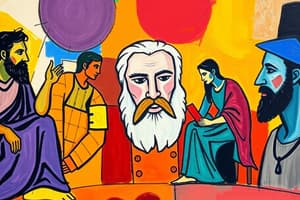Podcast
Questions and Answers
What does the term 'philosophia' translate to in English?
What does the term 'philosophia' translate to in English?
- Love of existence
- Love of reason
- Love of knowledge
- Love of wisdom (correct)
Which philosopher is known for introducing the Socratic method?
Which philosopher is known for introducing the Socratic method?
- Aristotle
- Socrates (correct)
- Epicurus
- Plato
What was the focus of Hellenistic Philosophy?
What was the focus of Hellenistic Philosophy?
- Critique of the state
- Pursuit of pleasure and happiness (correct)
- Rational skepticism
- Existential inquiry
Which philosopher's works marked the beginnings of modern philosophy by contrasting rationalism with empiricism?
Which philosopher's works marked the beginnings of modern philosophy by contrasting rationalism with empiricism?
What did the Theory of Forms, proposed by Plato, suggest?
What did the Theory of Forms, proposed by Plato, suggest?
Which philosophical school emphasized knowledge through sensory experience?
Which philosophical school emphasized knowledge through sensory experience?
In which period did scholars attempt to reconcile Christian doctrine with philosophical thought?
In which period did scholars attempt to reconcile Christian doctrine with philosophical thought?
What is the main idea behind Stoicism?
What is the main idea behind Stoicism?
Flashcards are hidden until you start studying
Study Notes
Love for Wisdom: Philosophy History
-
Definition of Philosophy:
- Originates from the Greek word "philosophia," meaning "love of wisdom."
- Encompasses the study of fundamental questions regarding existence, knowledge, values, reason, mind, and language.
-
Ancient Philosophy:
- Pre-Socratic Philosophers:
- Focused on cosmology, metaphysics, and the nature of being (e.g., Thales, Anaximander).
- Socrates:
- Introduced ethical inquiry and the Socratic method (dialogue for critical thinking).
- Emphasized self-knowledge and the idea that "the unexamined life is not worth living."
- Plato:
- Founded the Academy in Athens; wrote dialogues featuring Socrates.
- Proposed the Theory of Forms, suggesting that non-material abstract forms (ideas) represent the most accurate reality.
- Aristotle:
- Student of Plato; emphasized empirical observation and logic.
- His works covered diverse subjects, defining ethics, metaphysics, and politics.
- Pre-Socratic Philosophers:
-
Hellenistic Philosophy:
- Epicureanism: Focus on personal happiness and the pursuit of pleasure through moderation.
- Stoicism: Advocated for rational control over emotions and acceptance of fate; key figures include Seneca and Marcus Aurelius.
- Skepticism: Questioned the possibility of certain knowledge; followers like Pyrrho argued for suspension of judgment.
-
Medieval Philosophy:
- Integration of Faith and Reason:
- Scholars like Augustine and Aquinas sought to reconcile Christian doctrine with philosophical thought.
- Scholasticism: Method of critical thought using dialectical reasoning to extend knowledge; prominent in universities.
- Integration of Faith and Reason:
-
Renaissance Philosophy:
- Revitalization of classical philosophy and humanism, focusing on human potential and achievements.
- Increased emphasis on individual experience and empirical evidence.
-
Modern Philosophy:
- Rationalism vs. Empiricism:
- Rationalists (e.g., Descartes, Spinoza) emphasized reason as the source of knowledge.
- Empiricists (e.g., Locke, Hume) highlighted sensory experience.
- Kant: Synthesized rationalism and empiricism; introduced the concept of the categorical imperative in ethics.
- Rationalism vs. Empiricism:
-
Contemporary Philosophy:
- Diverse schools of thought, including existentialism (Sartre, Heidegger), analytic philosophy (Russell, Wittgenstein), and postmodernism (Foucault, Derrida).
- Ongoing debates about the nature of knowledge, reality, and ethics.
-
Key Themes:
- The pursuit of truth and understanding.
- The relationship between knowledge and ethics.
- The role of reason and experience in shaping human thought.
-
Influence of Philosophy:
- Shaped various fields including science, politics, art, and religion.
- Continues to influence contemporary discussions on morality, existence, and the human condition.
Definition of Philosophy
- Derived from the Greek "philosophia," translating to "love of wisdom."
- Engages with fundamental inquiries about existence, knowledge, values, reason, mind, and language.
Ancient Philosophy
- Pre-Socratic Philosophers:
- Pioneers in cosmology, metaphysics, and ontology (e.g., Thales, Anaximander).
- Socrates:
- Promoted ethical evaluation and the Socratic method, fostering critical dialogue.
- Advocated for self-awareness, famously stating, "the unexamined life is not worth living."
- Plato:
- Established the Academy in Athens; wrote dialogues that explored philosophical themes through Socratic discussions.
- Developed the Theory of Forms, positing that abstract ideas provide the truest understanding of reality.
- Aristotle:
- Plato’s student; emphasized the importance of empirical observation and logic.
- Authored texts covering various disciplines, effectively shaping ethics, metaphysics, and political theory.
Hellenistic Philosophy
- Epicureanism:
- Advocated personal happiness achieved through moderation in pleasure.
- Stoicism:
- Encouraged rational control of emotions and acceptance of fate; notable figures include Seneca and Marcus Aurelius.
- Skepticism:
- Challenged the attainability of certain knowledge; followers like Pyrrho promoted intellectual suspension of judgment.
Medieval Philosophy
- Integration of Faith and Reason:
- Thinkers like Augustine and Aquinas aimed to harmonize Christian teachings with philosophical reasoning.
- Scholasticism:
- A method employing dialectical reasoning to analyze and expand philosophical and theological knowledge, prevalent in medieval universities.
Renaissance Philosophy
- Revived classical philosophical ideals and emphasized humanism, spotlighting human capabilities and achievements.
- Shifted focus towards individual experiences and empirical inquiry.
Modern Philosophy
- Rationalism vs. Empiricism:
- Rationalists (e.g., Descartes, Spinoza) prioritized reason as the foundation of knowledge.
- Empiricists (e.g., Locke, Hume) emphasized knowledge derived from sensory experiences.
- Kant:
- Merged rationalist and empiricist paradigms; introduced the concept of the categorical imperative in ethical discussions.
Contemporary Philosophy
- Features varied schools of thought, including existentialism (Sartre, Heidegger), analytic philosophy (Russell, Wittgenstein), and postmodernism (Foucault, Derrida).
- Engages in current debates surrounding knowledge, reality, and ethics.
Key Themes
- Central to philosophical inquiry are the pursuit of truth and an understanding of knowledge.
- Explores the interplay between ethics and knowledge, emphasizing the impact of reason and experience on human thought.
Influence of Philosophy
- Has significantly shaped disciplines such as science, politics, art, and religion.
- Continues to inform contemporary debates regarding morality, existence, and the essence of the human experience.
Studying That Suits You
Use AI to generate personalized quizzes and flashcards to suit your learning preferences.




